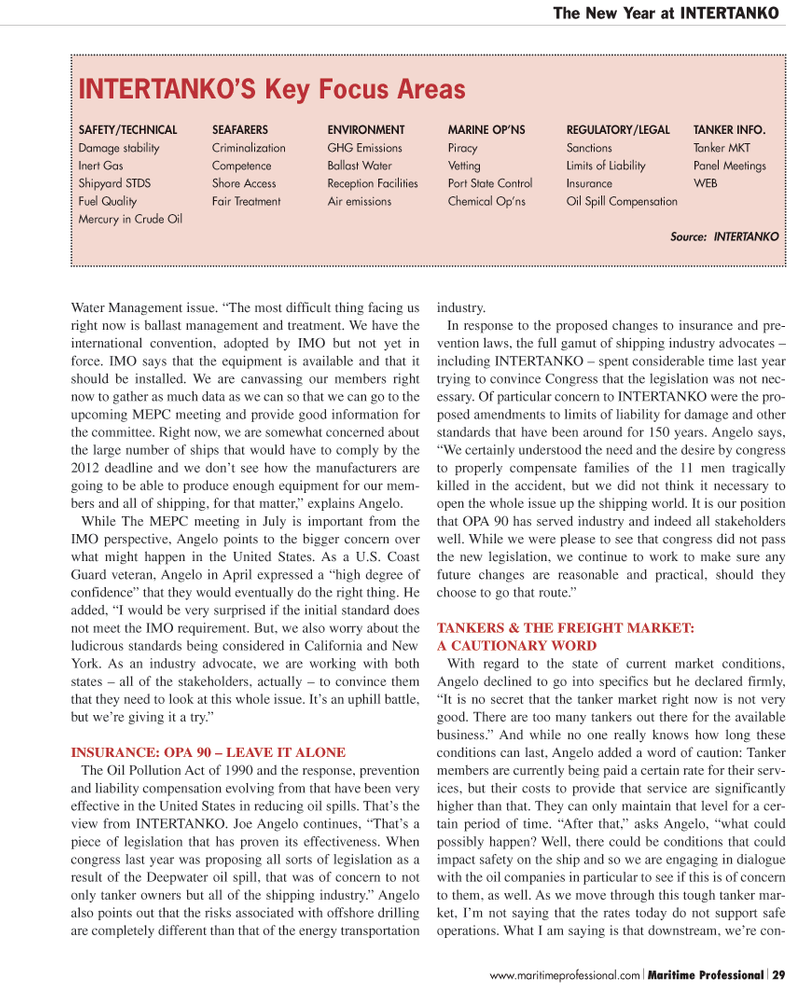
Page 29: of Maritime Logistics Professional Magazine (Q2 2011)
Energy Transportation
Read this page in Pdf, Flash or Html5 edition of Q2 2011 Maritime Logistics Professional Magazine
www.maritimeprofessional.com Maritime Professional 29
The New Year at INTERTANKO
Water Management issue. “The most difficult thing facing us right now is ballast management and treatment. We have the international convention, adopted by IMO but not yet in force. IMO says that the equipment is available and that it should be installed. We are canvassing our members right now to gather as much data as we can so that we can go to the upcoming MEPC meeting and provide good information for the committee. Right now, we are somewhat concerned about the large number of ships that would have to comply by the 2012 deadline and we don’t see how the manufacturers are going to be able to produce enough equipment for our mem- bers and all of shipping, for that matter,” explains Angelo.
While The MEPC meeting in July is important from the
IMO perspective, Angelo points to the bigger concern over what might happen in the United States. As a U.S. Coast
Guard veteran, Angelo in April expressed a “high degree of confidence” that they would eventually do the right thing. He added, “I would be very surprised if the initial standard does not meet the IMO requirement. But, we also worry about the ludicrous standards being considered in California and New
York. As an industry advocate, we are working with both states – all of the stakeholders, actually – to convince them that they need to look at this whole issue. It’s an uphill battle, but we’re giving it a try.”
INSURANCE: OPA 90 – LEAVE IT ALONE
The Oil Pollution Act of 1990 and the response, prevention and liability compensation evolving from that have been very effective in the United States in reducing oil spills. That’s the view from INTERTANKO. Joe Angelo continues, “That’s a piece of legislation that has proven its effectiveness. When congress last year was proposing all sorts of legislation as a result of the Deepwater oil spill, that was of concern to not only tanker owners but all of the shipping industry.” Angelo also points out that the risks associated with offshore drilling are completely different than that of the energy transportation industry.
In response to the proposed changes to insurance and pre- vention laws, the full gamut of shipping industry advocates – including INTERTANKO – spent considerable time last year trying to convince Congress that the legislation was not nec- essary. Of particular concern to INTERTANKO were the pro- posed amendments to limits of liability for damage and other standards that have been around for 150 years. Angelo says, “We certainly understood the need and the desire by congress to properly compensate families of the 11 men tragically killed in the accident, but we did not think it necessary to open the whole issue up the shipping world. It is our position that OPA 90 has served industry and indeed all stakeholders well. While we were please to see that congress did not pass the new legislation, we continue to work to make sure any future changes are reasonable and practical, should they choose to go that route.”
TANKERS & THE FREIGHT MARKET:
A CAUTIONARY WORD
With regard to the state of current market conditions,
Angelo declined to go into specifics but he declared firmly, “It is no secret that the tanker market right now is not very good. There are too many tankers out there for the available business.” And while no one really knows how long these conditions can last, Angelo added a word of caution: Tanker members are currently being paid a certain rate for their serv- ices, but their costs to provide that service are significantly higher than that. They can only maintain that level for a cer- tain period of time. “After that,” asks Angelo, “what could possibly happen? Well, there could be conditions that could impact safety on the ship and so we are engaging in dialogue with the oil companies in particular to see if this is of concern to them, as well. As we move through this tough tanker mar- ket, I’m not saying that the rates today do not support safe operations. What I am saying is that downstream, we’re con-
INTERTANKO’S Key Focus Areas
SAFETY/TECHNICAL SEAFARERS ENVIRONMENT MARINE OP’NS REGULATORY/LEGAL TANKER INFO.
Damage stability Criminalization GHG Emissions Piracy Sanctions Tanker MKT
Inert Gas Competence Ballast Water Vetting Limits of Liability Panel Meetings
Shipyard STDS Shore Access Reception Facilities Port State Control Insurance WEB
Fuel Quality Fair Treatment Air emissions Chemical Op’ns Oil Spill Compensation
Mercury in Crude Oil
Source: INTERTANKO

 28
28

 30
30
